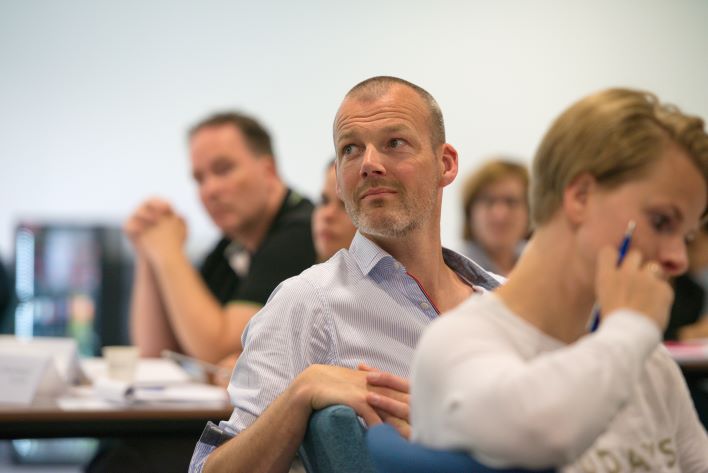Incorrect decisions by management have major consequences for organizations’ performance in the area of digitization. “The ability of management and staff to make full use of IT investments determines the market value that companies achieve with digitization. Incorrect decisions can therefore be extremely costly.” In her inaugural speech on September 11, 2019, Prof. Dr. Cokky Hilhorst will discuss the rationale behind IT investments. The speech is titled: “Stop guessing: towards better decisions about IT investments”. Hilhorst will deliver this speech to mark her acceptance of the chair in Business & IT at Nyenrode Business Universeit.
Digitization involves a lot of money. Digitally proficient companies can generate 45 to 75% more market value compared to businesses that perform poorly in this area. In her speech, Hilhorst distinguishes between daring and less daring IT investments. The latter category is aimed at structuring organizations more efficiently. This is something all organizations deal with, such as when implementing financial administration systems. Daring investments, on the other hand, are more drastic. In this case, the business model is changed. These IT investments create a long-term increase in the market value.
Both the private sector and the Dutch government spend a great deal of money on digitization. According to the government, 1.25% of all tax revenues are spent on IT investments. This amounts to around €3.5 billion per year, and Hilhorst estimates that this figure is actually higher. American research shows that the US government spends roughly 5% of its tax revenues on IT. Although not exactly comparable, that €3.5 billion is certainly a lower limit. “The government and IT are not always seen as a happy marriage, but research shows that IT investments are indeed useful. IT investments can cause government authorities to shrink and yet still perform better due to efficiency gains.”
Optimism and over-confidence
Although digitization is becoming increasingly important, not all organizations are able to optimally benefit from the technological developments. Incorrect decisions in the area of digitization can be extremely costly. Nevertheless, IT project budgets are still exceeded by an average of 45% while delivering only half of the value predicted, as outlined by Hilhorst in her speech. Why are IT investments so difficult? Hilhorst explains: “When making decisions, people often respond quickly and intuitively. These quick decisions lead to mistakes, and decisions end up being made which are not economically beneficial. People often make plans that are too optimistic, for example, and they can be over-confident when assessing risks. Because IT decisions are complex and uncertain, they require more time for thought and careful consideration. It is important to combine various insights before making choices.”
Language use
An indication of overly optimistic planning within an IT project is the type of language used. Hilhorst: “Our research shows that the use of abstract language in project and business plans is associated with a lower likelihood of running behind schedule or over budget. This has to do with the greater psychological distance from a project when abstract language is used. Such distance allows for better and more realistic planning. In contrast, the use of concrete language can be a warning sign for imminent project delays. If you’re concrete, then it becomes ‘your’ project, you get more involved, you feel more optimistic and therefore have a higher chance of going off track.”
Stop guessing
Hilhorst advises organizations to stop guessing: “People need to resist the temptation to make decisions too quickly. It is important to thoroughly substantiate each decision by combining research methods: you have to understand the business context, but also use data on the existing IT systems. IT is not a black box, and gathering facts about the application landscape, for instance, can lead to much more well-informed decisions. When planning projects, it is important to use reference data as well. By basing a decision on facts and various research methods, excessive optimism can be avoided. The time it takes to properly substantiate these decisions is more than worthwhile in the end.”
Lastly, according to Hilhorst, what matters is the actual desire to improve and the skills associated with this. “It’s often a question of culture. You have to be willing to make adjustments, postpone or stop a project. The ability to be successful requires you to dare to make mistakes and take risks instead of just continuing to muddle along. With these concrete actions, IT investments can be much more successful in organizations.”
Documents
-
Publication date 9/11/2019File size 364 KB
Related programs
-
Digital Strategy and Transformation
Start date: March 3rd, 2026 - September 8th. 2026Language:- English
Location:- Breukelen
The module Digital Strategy and Transformation looks at the strategic perspective of digital transformation. Part of our Modular Executive MBA Business & IT.
View program
-
Strategic Marketing and Innovation
Start date: October 1, 2026Language:- English
Location:- Breukelen
Through the range of advanced strategic marketing (e-commerce, segmentation, omni-channel, social media) and actual business cases (big data, privacy, migration from offline to online, integrating online and offline) participants will discuss how marketing and technology can strengthen each other.
View program
-
Business Ethics in context
Start date: September 24, 2026Language:- English
Location:- Breukelen
Explore the interfaces between market, law and ethics. Part of the modular MBA Business & IT.
View program
-
Business Processes and Management
Start date: March 3th 2026Language:- Dutch
Location:- Breukelen
This module is only given in Dutch. Please visit our Dutch site.
View program
